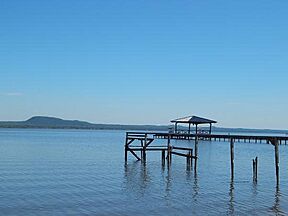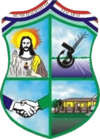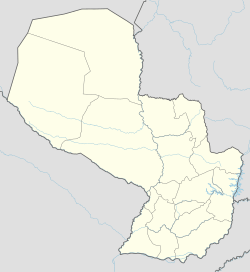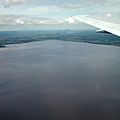Ypacaraí facts for kids
Quick facts for kids
Ypacaraí
Ypakarai
|
|||
|---|---|---|---|
|
District
|
|||
|
Clockwise from top: the inside of the Mother of Good Counsel Church, a view of the lake, a train departing from the city's station and the city hall building.
|
|||
|
|||
| Etymology: Blessed lake | |||
| Nickname(s):
City of Folklore
|
|||
| Government | |||
|
• Mayor
|
Raúl Fernando Negrete Caballero (PLRA) | ||
| Area | |||
|
• Total
|
111 km2 (43 sq mi) | ||
| Elevation | 64.1 m (210.3 ft) | ||
| Population | |||
|
• 2023 estimate
|
29,578 | ||
|
• Density
|
16.12/km2 (41.8/sq mi) | ||
| Time zone | UTC-4 | ||
| Calling code | 513 | ||
| Website | https://www.municipalidaddeypacarai.gov.py | ||
Ypacaraí (Guarani: Ypakarai) is a town in Paraguay. It is located in the Central Department of Paraguay. The town sits right by the beautiful Lake Ypacaraí.
Ypacaraí is part of Paraguay's main highway system. It is found between the cities of Asunción and Caacupé. It is also close to Areguá and San Bernardino. Ypacaraí is known as the "City of Folklore." This nickname comes from the famous Ypacaraí Festival. The town is built on the Ybytypanemá mountain range, near the lake. In 2020, about 28,283 people lived there. The town is 64.1 meters (about 210 feet) above sea level. Farmers in the area grow tobacco and cotton. Lake Ypacaraí is a popular spot for both tourists and local people. This is especially true because Paraguay does not have a coastline.
The famous Paraguayan football player Carlos Gamarra grew up in Ypacaraí.
Contents
What's in a Name?
The city gets its name from its lake. The lake's name comes from an old language called Classical Guarani. Ĭpacarai means "blessed lake." This name was given because a missionary named Luis de Bolaños blessed the lake in 1603. He did this to stop its waters from flooding the nearby Valley of Pirayú.
A Look at History
Ypacaraí was a small community by the end of the 1600s. It was first known as "Guazú Virá." Later, its name changed to "Tacuaral."
On March 27, 1864, a new railway line opened. It reached the Guazú Virá station, which was then called "Estación Tacuaral." The community grew a lot around this train station. Over time, people wanted Ypacaraí to become its own separate town. They formed a group to ask the President of Paraguay, General Patricio Escobar. This group included people like Lytton Snead and José Galo Guanes.
On September 13, 1887, Ypacaraí officially became a new district. Mr. Higinio Escobar became the first police chief and justice of the peace. Father Adolfo Valenzuela was in charge of religious services. During a difficult time in Paraguay's history, Ypacaraí was not given much support. Because of this, it became known as "the capital of folklore and democracy."
Where is Ypacaraí?
Ypacaraí is located in the center of Paraguay. To the west, it borders Areguá. To the south, it borders Itá. To the north is Ypacaraí Lake. To the east is the Cordillera Department. Ypacaraí is part of the larger Greater Asunción Area.
Waterways
Several small streams flow into Lake Ypacaraí. These include Pirayú, Paso Puente, Estrella, and Jukury. The lake's waters then flow into the Paraguay River. This happens through the Salado River.
Ypacaraí Lake has inspired many people. It led to the creation of the famous song "Memories of Ypacaraí." This song was written by Zulema de Mirkin and Demetrio Ortiz. The lake is about 22 kilometers (13.7 miles) long from north to south. It is between 5 and 6 kilometers (3 to 3.7 miles) wide. The lake is about 3 meters (10 feet) deep. It is surrounded by beautiful green plants and trees.
Weather in Ypacaraí
In summer, the highest temperature can reach 40°C (104°F). Sometimes it can get even hotter. In winter, the lowest temperature can be around -2°C (28°F). The average temperature for the whole year is 22°C (72°F).
What Ypacaraí Makes
The main things made in Ypacaraí are guitars and leather crafts. People also make blankets, bedspreads, and hammocks. There are also many small factories that make homemade chipa, a type of bread.
Ypacaraí has a lot of farming and industry. Many factories are found here. These include places that process cotton, make textiles, and work with wood. There are also factories that refine vegetable oil. The well-known Ypacaraí Lake festival brings money to the city. An expo fair is also held every year in the city center.
Culture and Fun
In Ypacaraí, you can visit the monument to music. This monument is a symbol of the Ypacaraí Festival. When you enter the city, you will see the Sacred Heart of Jesus Church. There is also the "House of Culture: Teodoro S. Mongelós." Inside, you can find the resting places of Teodoro S. Mongelós and Demetrio Ortiz. Demetrio Ortiz was the person who created "Memories of Ypacaraí."
This Cultural Center also has the "Memoria Ypacaraiense" Museum. It shows items from the war of 1870. It also displays things from important people who lived in the city.
Francisco Gaona, an educator and historian, was born here in 1901. He wrote a book about the history of workers in Paraguay.
There is a local legend called Luisón de Tacuaral. This story started in a nearby area called Cerrito.
The Paraguayan rock bands Salamandra and Bohemia Urbana are from Ypacaraí. They are very popular both in Paraguay and other countries. They often film their music videos in the city.
The main public square is very important to the city's culture and history. It is connected to the old train station and the House of Culture.
Places of Worship
The Sacred Heart of Jesus parish is the main church in the city. There is also a convent for the Franciscan sisters. The Shrine of the Virgin of Schoenstatt of Tuparendá is a copy of a famous sanctuary in Germany. It has a beautiful garden and can host many groups. The Salesian Church of Don Bosco is also in Ypacaraí.
Sports in Ypacaraí
In 2010, the government opened the National Bicentennial Stadium of Ypacaraí. This was to celebrate Paraguay's 200th birthday.
Carlos Gamarra was born in Ypacaraí in 1971. He was the captain of the Paraguayan football team. He played in the World Cups in France 1998, Korea-Japan 2002, and Germany 2006. He was one of the best defenders from Paraguay in the world. He played for famous clubs like Internazionale and Atlético de Madrid. He also played for Paraguay's most traditional teams, Cerro Porteño and Club Olimpia. He was the captain of the football team that won Paraguay's only Olympic medal in sports at Athens 2004.
Partner Cities
Ypacaraí has special connections with other cities. These are called "sister cities."
- Santa Fe, Argentina (since 1978)
- San Gregorio de Polanco, Uruguay
Images for kids
-
Ypacaraí Lake, Ypacaraí, Paraguay
See also
 In Spanish: Ypacaraí para niños
In Spanish: Ypacaraí para niños
 | Roy Wilkins |
 | John Lewis |
 | Linda Carol Brown |












